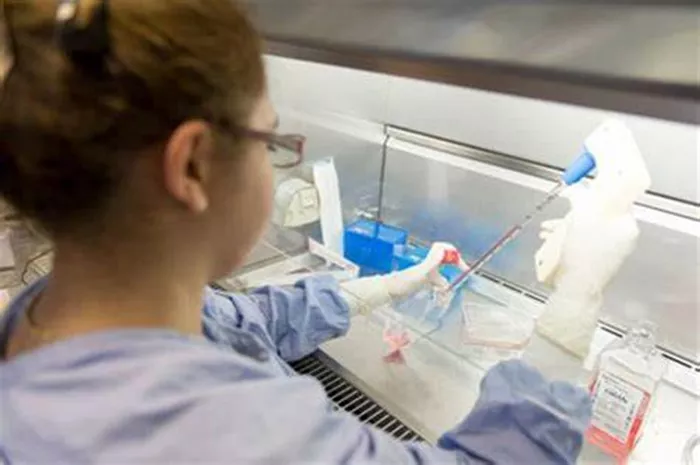A groundbreaking development in cancer treatment is offering renewed hope for patients with prostate cancer. Researchers at City of Hope Hospital in Duarte, California, have unveiled promising early results from clinical trials of CAR-T cell therapy. This innovative approach, which harnesses the body’s immune system to target cancer cells, has already shown success in treating several cancers, including melanoma and certain blood cancers. Now, it is being tested against prostate cancer, one of the most challenging malignancies to treat with immunotherapy.
How CAR-T Immunotherapy Works
CAR-T cell therapy involves reprogramming the body’s own immune cells, specifically T cells, to attack cancer. The cells are extracted from the patient and engineered to express chimeric antigen receptors (CARs), which help them recognize and bind to specific proteins on the surface of cancer cells. Once reintroduced into the body, these modified T cells target and destroy the cancerous cells.
Although CAR-T cell treatments have primarily been approved for blood cancers, researchers are now exploring their potential for solid tumors like prostate cancer. This represents a significant shift in how doctors may approach this disease, which has traditionally been resistant to many forms of immunotherapy.
Clinical Trial Results Offer Hope
In the ongoing study, 14 patients with metastatic prostate cancer that no longer responded to hormonal therapy were treated with 100 million CAR-T cells. The engineered cells were designed to target prostate stem cell antigen (PSCA), a protein that is highly expressed in advanced prostate tumors. Some patients also received a treatment called lymphodepletion, which helps the CAR-T cells function more effectively by reducing interference from the body’s other T cells.
The results, while preliminary, are promising. Four patients experienced a drop in prostate-specific antigen (PSA) levels by 30% or more—a key indicator that the tumors were shrinking. One patient saw a PSA reduction of over 90% within 28 days, alongside tumor shrinkage in bones and soft tissue. This response lasted for eight months. While the treatment did cause mild side effects, including a cytokine release syndrome in five patients, these were manageable and effectively treated.
Challenges and Future Research
Despite the positive results, the study also revealed limitations. The CAR-T cells did not remain in the body at high levels beyond the monitoring period, which could impact long-term effectiveness. Researchers are now focusing on finding ways to extend the lifespan and impact of these modified cells.
Prostate cancer is known for being “immunologically cold,” meaning it is adept at evading the immune system. As a result, many immunotherapies have had limited success against it. However, CAR-T therapy may offer a more robust solution, according to Dr. Tanya Dorff, a medical oncologist at City of Hope and lead author of the study. She believes this approach could help overcome the cancer’s defenses in ways previously unattainable with other treatments.
Expert Insights on the Future of CAR-T for Prostate Cancer
Experts outside of the study have weighed in on the potential of CAR-T therapy for prostate cancer. Dr. David Einstein, a medical oncologist at Beth Israel Deaconess Medical Center, cautioned that while the results are encouraging, lymphodepletion—a crucial part of the treatment—can leave patients vulnerable to infections. Additionally, the risk of cytokine release syndrome may limit CAR-T therapy to a select group of patients.
“This is a more intensive treatment compared to hormonal therapy or chemotherapy,” says Dr. Einstein. “However, the data suggests that CAR-T therapy could emerge as a new option for certain patients with advanced prostate cancer.”
Dr. Marc Garnick, a professor of medicine at Harvard Medical School and editor-in-chief of the Harvard Medical School Guide to Prostate Diseases, also expressed optimism about the future of CAR-T therapy in prostate cancer treatment. “This research represents the beginning of a novel method to eliminate cancer cells that have spread beyond the prostate gland,” Garnick said. However, he stressed the importance of further research to understand the mechanisms behind this therapy and reduce its associated side effects.
Looking Ahead
As researchers continue to refine CAR-T cell therapy, the hope is that it will become a viable treatment option for men with prostate cancer, particularly those with metastatic disease that has resisted other therapies. Although there are still challenges to overcome, this early success signals a potential turning point in the fight against one of the most difficult cancers to treat. CAR-T therapy, with its powerful ability to harness the immune system, may soon provide a much-needed lifeline for prostate cancer patients who have exhausted other treatment options.
[inline_related_posts title=”You Might Be Interested In” title_align=”left” style=”list” number=”6″ align=”none” ids=”12354,12411,12407″ by=”categories” orderby=”rand” order=”DESC” hide_thumb=”no” thumb_right=”no” views=”no” date=”yes” grid_columns=”2″ post_type=”” tax=””]


































